Overview
The article serves as a compassionate guide for finding Clinical Documentation Specialist jobs, recognizing the emotional challenges faced by healthcare providers. It emphasizes the significance of networking, utilizing job boards, and tailoring applications to alleviate the stress of job searching. By detailing effective job search strategies—such as attending industry events and joining professional organizations—it provides solutions that resonate with the audience's experiences. Customizing application materials not only enhances visibility but also appeals to potential employers, fostering a sense of hope and empowerment.
Are you feeling overwhelmed by the administrative burdens that impact patient care? You're not alone. This guide encourages you to take proactive steps in your job search, reminding you that your skills and dedication are invaluable. Embrace the journey by connecting with others in your field and seeking out opportunities that align with your passion for healthcare. With each tailored application, you're not just seeking a job; you're advocating for the quality of care that patients deserve.
Take heart in knowing that there are supportive communities and resources available to help you navigate this process. Remember, every effort you make brings you closer to a fulfilling career. Now is the time to engage with your network, explore job boards, and invest in your future with confidence.
Introduction
In the ever-evolving landscape of healthcare, the role of a Clinical Documentation Specialist (CDS) has emerged as a cornerstone in ensuring the accuracy and compliance of patient records. These professionals are vital not only for enhancing the quality of care but also for alleviating the administrative burdens that can impact patient outcomes. As healthcare systems increasingly rely on precise documentation to optimize reimbursement and maintain regulatory standards, the demand for skilled CDS professionals continues to rise.
Have you ever considered how the meticulous work of a CDS supports healthcare providers in their mission to deliver exceptional care? This article delves into the multifaceted responsibilities of Clinical Documentation Specialists, the essential skills and qualifications required for success, and effective strategies for navigating the job market. By exploring the significance of networking, leveraging online resources, and preparing for interviews, aspiring CDS candidates can position themselves for rewarding careers in this dynamic field. Together, we can navigate the complexities of healthcare documentation, ensuring that every patient receives the attention and care they deserve.
Understanding the Role of a Clinical Documentation Specialist
In the ever-evolving healthcare landscape, the role of a Clinical Documentation Specialist (CDS) is essential. These dedicated professionals ensure that patient records are not only accurate and complete but also compliant with regulatory standards. This responsibility is crucial, as precise documentation significantly impacts coding, billing, and the overall quality of patient care. By meticulously examining clinical records, CDS professionals help ensure that they accurately reflect the patient's condition and the care provided, which is vital for effective treatment and continuity of care.
The responsibilities of a CDS encompass several key areas:
- Review and analyze clinical documentation for accuracy and completeness, ensuring that all relevant information is captured.
- Collaborate with medical professionals to enhance record-keeping methods, fostering a culture of ongoing improvement in clinical data accuracy.
- Ensure compliance with regulatory standards and coding guidelines, which is vital for maintaining operational efficiency and avoiding potential legal issues.
- Assist in training personnel on best practices for record-keeping, empowering healthcare teams to create high-quality files.
- Engage in quality enhancement efforts related to clinical records, contributing to improved patient outcomes and optimized operational processes.
Recent studies underscore the importance of efficient record-keeping practices. For instance, the availability of standardized record-keeping tools has been shown to increase the likelihood of documenting routine practices by 2.5 times. This highlights the significance of organized systems in enhancing the quality of clinical records. Moreover, accurate clinical records are directly linked to improved patient care quality, ensuring that medical providers have access to complete and trustworthy information when making clinical decisions.
A recent study assessed the documentation practices of health professionals, emphasizing its importance for better diagnosis, treatment, continuity of care, and medicolegal considerations.
As the medical landscape continues to evolve, the role of Clinical Documentation Specialists becomes increasingly vital. Their expertise not only supports medical providers in delivering high-quality care but also plays a crucial role in optimizing billing processes and ensuring compliance with ethical standards. As illustrated in a case study on CosmaNeura's AI platform, implementing AI solutions can lead to significant time efficiency for clinicians and enhance job satisfaction by reducing administrative burdens.
This specialized support is particularly essential for medical startups navigating regulatory hurdles, such as those imposed by the Food and Drug Administration and the Health Insurance Portability and Accountability Act. It allows them to focus on delivering quality care while ensuring compliance. Furthermore, understanding the distinct purchasing processes and decision-making structures within medical organizations is crucial for CDS professionals to effectively contribute to operational success. As healthcare advances, the demand for skilled professionals in will likely grow, making this an opportune time for those seeking careers in this field.
As noted by AWD, "Ethics approval was obtained from the Institutional Review Committee of the health science college of Mettu University with reference number ARcsu/271/24," underscoring the importance of compliance in clinical documentation.
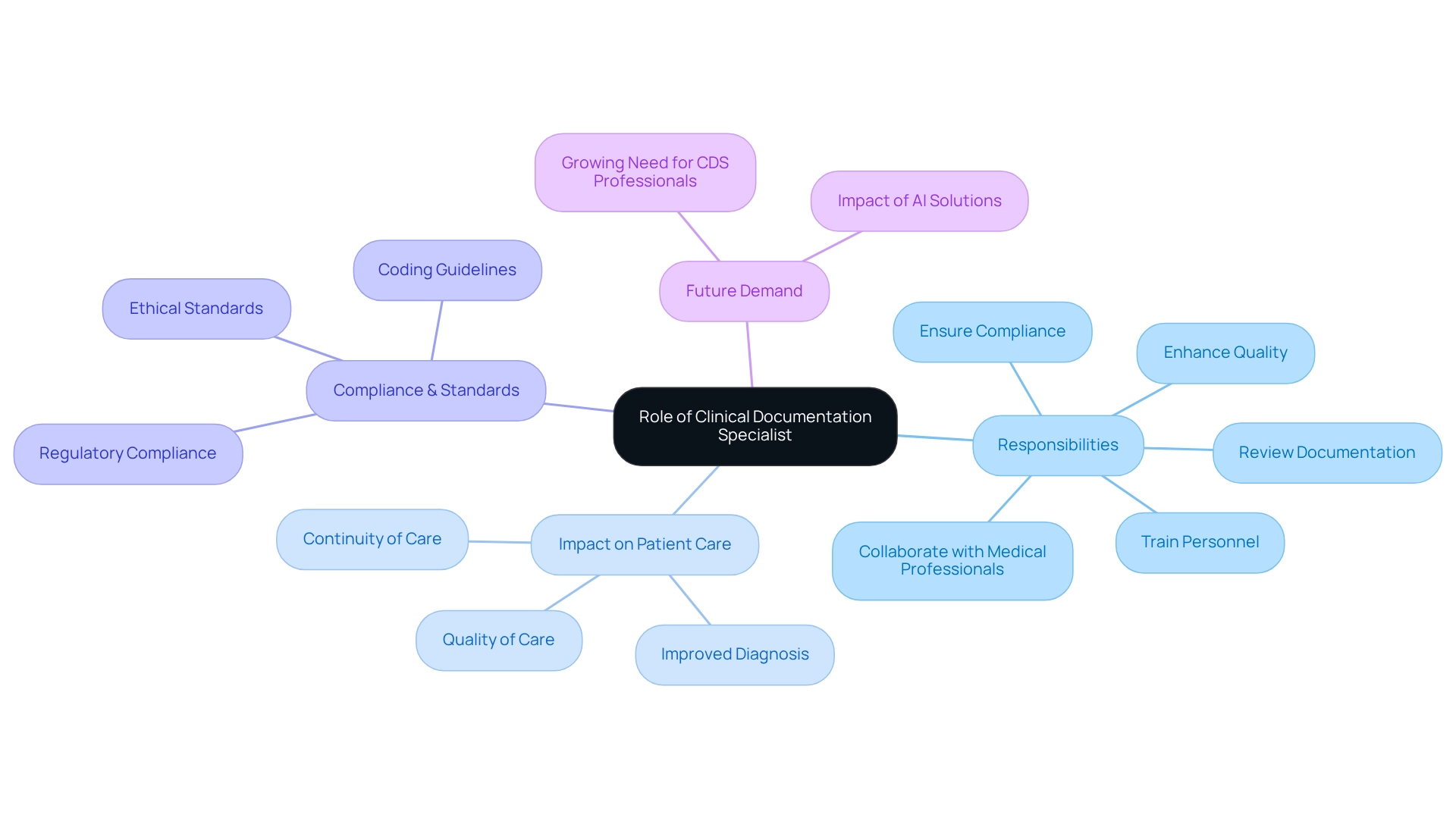
Essential Skills and Qualifications for Clinical Documentation Specialists
To thrive as a Healthcare Records Specialist, it's essential for candidates to blend relevant education, vital skills, and certifications. This journey begins with understanding the key qualifications that pave the way for success in this rewarding role.
Educational Background:
- A minimum of an associate's or bachelor's degree in health information management, nursing, or a related field is typically required.
- Completion of a Clinical Documentation Improvement (CDI) training program is highly regarded and often preferred by employers.
Key Skills:
- Attention to Detail: This critical skill helps identify discrepancies in documentation, ensuring accuracy and compliance with healthcare regulations. Have you ever noticed how a small detail can make a big difference?
- Analytical Skills: Proficiency in analyzing clinical data and a solid understanding of medical terminology are essential for effective record-keeping. These skills not only enhance accuracy but also contribute to better patient outcomes.
- Communication Skills: Strong verbal and written communication abilities are vital for engaging with medical professionals and ensuring clarity in record-keeping processes. As John Powell aptly stated, "Communication works for those who work at it," highlighting its importance in this role. How can effective communication transform team dynamics?
- Technical Proficiency: Familiarity with Electronic Health Records (EHR) systems and coding software is crucial, as these tools are integral to contemporary medical record-keeping.
- Problem-Solving Skills: The ability to proactively tackle documentation challenges and collaborate with medical teams is essential for upholding high standards of patient care. What strategies have you found helpful in overcoming obstacles?
Current Job Market Insights: The demand for clinical documentation specialist jobs is robust, particularly with medical billing specialists leading the market. Between September 2022 and August 2023, there were 5,832 unique job postings for medical billing specialists, underscoring the growing need for skilled professionals in this area. This trend highlights the importance of possessing the right qualifications and skills to stand out in a competitive job market, especially in clinical documentation specialist roles, which are vital to the effective operation of medical systems.
Case Studies on Essential Skills: For instance, organizations that have implemented comprehensive training programs for Clinical Documentation Specialists have reported significant improvements in documentation accuracy and compliance. These programs often emphasize enhancing analytical and communication abilities, which are essential for effective collaboration within medical teams. Moreover, platforms such as CosmaNeura improve medical service delivery by automating administrative tasks, allowing record specialists to focus on their primary duties and enhance patient care outcomes.
By concentrating on these educational and skill-oriented qualifications, can prepare themselves for success in a dynamic and evolving medical environment. This aligns with the mission of healthcare professionals to uphold ethical practices and enhance the quality of care, ultimately making a meaningful difference in patients' lives.
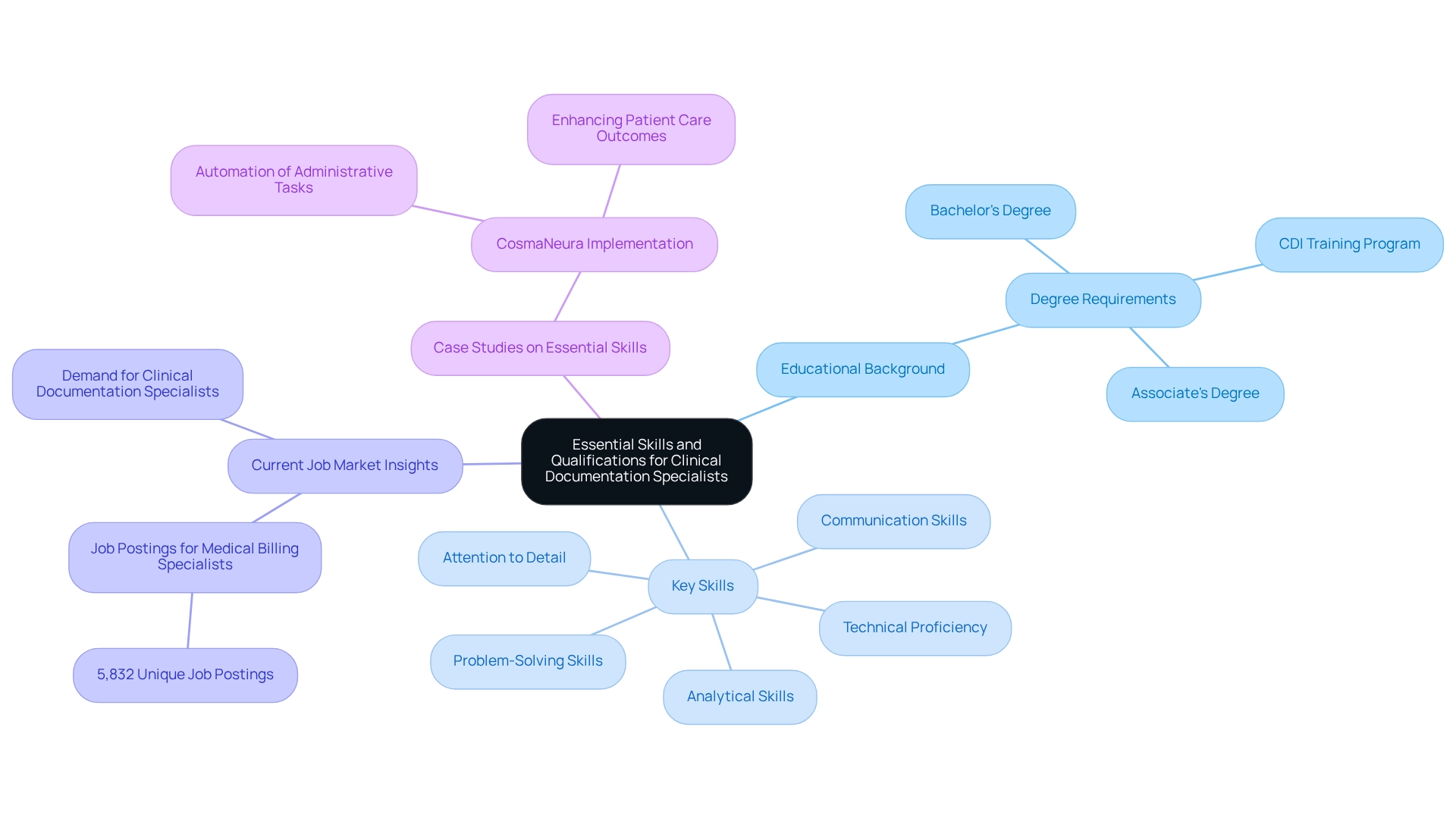
Effective Job Search Strategies for Clinical Documentation Specialist Positions
Securing a position as a Medical Record Specialist (CDS) can feel overwhelming, but with a thoughtful and informed approach, you can navigate this journey successfully. Here are some compassionate strategies to support your job search:
Networking
- Attend healthcare conferences and workshops to connect with industry professionals and expand your network. These gatherings can be a source of encouragement and inspiration.
- Join professional groups, such as the Association of Integrity Specialists (ACDIS), to connect with colleagues and gain access to exclusive job opportunities that align with your aspirations.
- Leverage social media platforms like LinkedIn to follow industry leaders and participate in relevant discussions, fostering relationships that can lead to new opportunities.
Online Job Boards
- Utilize specialized job boards, including ACDIS Jobs, Indeed, and ZipRecruiter, to discover openings tailored to your expertise. These resources can ease the search process and help you find roles that resonate with your skills.
- Create job notifications for clinical documentation specialist positions nearby to stay informed about new opportunities as they arise, allowing you to act promptly.
Tailored Applications
- Customize your resume and cover letter for each application, emphasizing relevant skills and experiences that align with the job requirements. Personalization can make a significant difference in how you present yourself to potential employers.
- Incorporate keywords from the job description to enhance your chances of passing through Applicant Tracking Systems (ATS), which many employers use to filter candidates, ensuring your application stands out.
Informational Interviews
- Reach out to professionals in the field for informational interviews, which can provide valuable insights and advice on navigating the job market. These conversations can be enlightening and affirming.
- Prepare thoughtful questions to maximize the benefit of these discussions, focusing on industry trends and effective job search strategies that resonate with your journey.
Current Trends
- Stay informed about the latest trends in job search strategies for Clinical Documentation Specialists, as the landscape is continually evolving. For instance, a recent study revealed that 76% of patients interacted with medical providers at some point during their journey, underscoring the growing need for skilled record-keeping specialists. This trend highlights the crucial role of efficient record-keeping in enhancing patient care, particularly in faith-based medical environments supported by CosmaNeura.
By embracing these approaches, you can enhance your job search efforts and increase your chances of finding a fulfilling role as a Specialist in Medical Records. As Rottinghaus et al. noted, "Today, I was totally amazed by thinking about my career future," reflecting the optimism and potential in this field.
Moreover, consider how AI solutions, such as those offered by CosmaNeura, are transforming and improving job satisfaction among providers, further emphasizing the vital role of documentation specialists. Your journey is important, and with the right strategies, you can find a path that fulfills your professional goals.
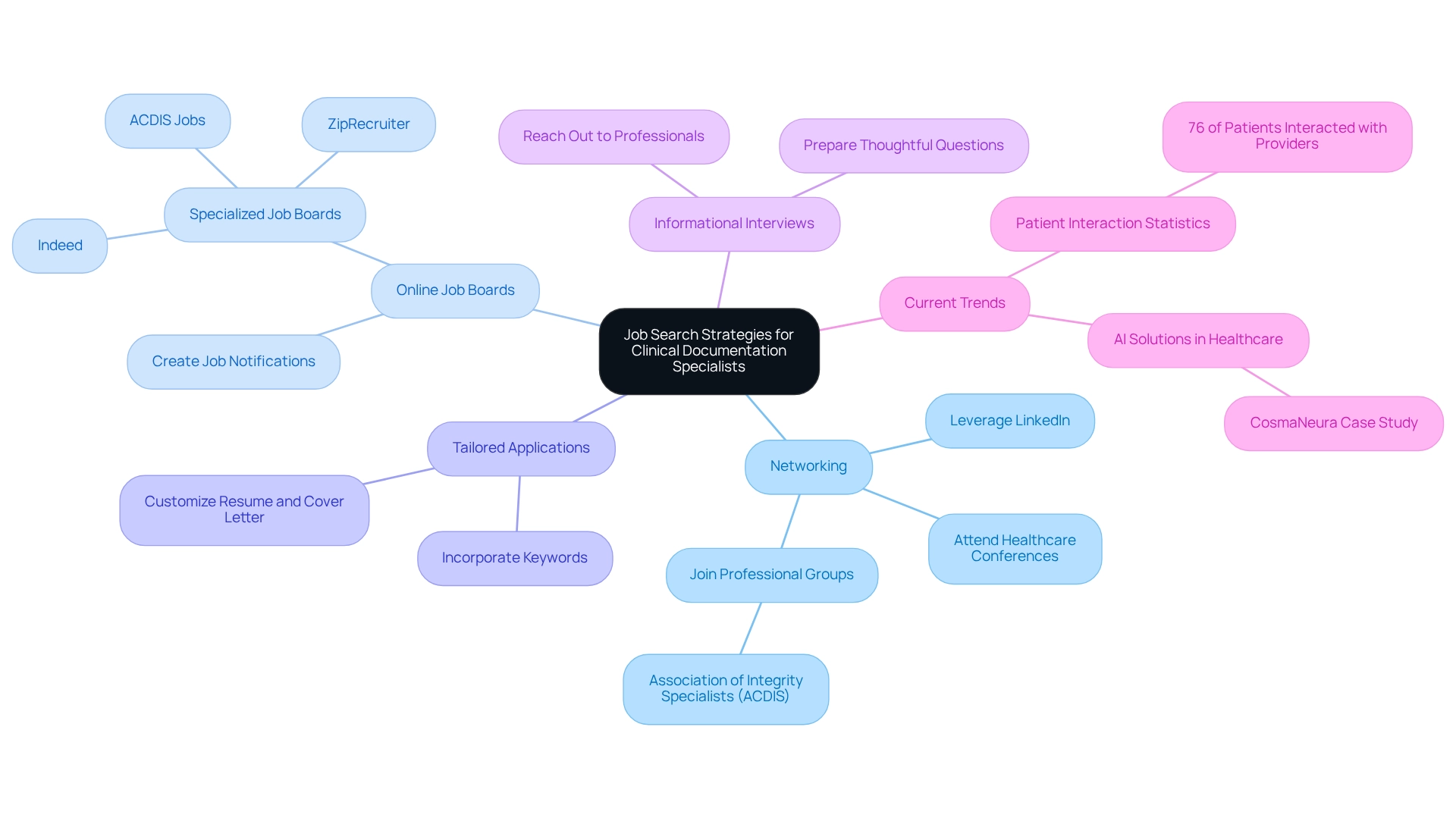
Leveraging Networking Opportunities in Healthcare
Networking is essential for advancing your career and discovering clinical documentation specialist jobs near you. It can feel daunting, but effective strategies can help you leverage networking opportunities with confidence:
-
Attend Industry Events:
Engaging in healthcare conferences, seminars, and workshops allows you to connect with fellow professionals in the field. These events provide a platform for meaningful discussions and the chance to exchange contact information with peers and industry leaders. Have you considered how these connections could enhance your career? -
Join Professional Organizations:
Becoming a member of organizations such as ACDIS or AHIMA opens doors to valuable resources and networking events tailored for CDS professionals. Active participation in forums and online communities focused on clinical documentation specialist jobs near you can enhance your connections and provide insights into industry trends. Imagine the support you could gain from a community of dedicated professionals. -
Utilize Social Media:
Leverage LinkedIn to build your professional network by connecting with industry experts and joining relevant groups. Sharing articles and insights related to clinical documentation not only establishes your expertise but also attracts connections who share your interests. How can you showcase your knowledge to draw in like-minded professionals? -
Success Stories and Statistics:
Many Clinical Documentation Specialists have successfully advanced their careers by actively engaging with professional organizations. Current membership statistics for organizations like ACDIS indicate a growing community of professionals dedicated to enhancing their skills and networking. Additionally, the projected employment change for medical records specialists, particularly for clinical documentation specialist jobs near you, from 2023 to 2033 is expected to increase from 191,500 to 208,200. This highlights the importance of networking in a growing field. Have you thought about how networking could open new doors for you?- Networking has been shown to significantly impact career advancement, with studies indicating that professionals who actively network are more likely to secure job opportunities and promotions.
-
Expert Opinions:
Industry experts emphasize the importance of networking in healthcare, noting that building relationships can lead to mentorship opportunities and insider knowledge about job openings. A current employee noted that their workplace is a "Good Place to Work," underscoring the value of networking in securing favorable positions. How might these insights shape your networking approach? -
Case Studies:
Consider the case of a Clinical Documentation Specialist who leveraged networking strategies to transition into a leadership role. By attending industry events and engaging with peers, they gained insights that helped them navigate their career path effectively. The implementation of has led to significant improvements in administrative efficiency and job satisfaction for healthcare providers, illustrating how professional engagement can enhance career advancement.
By actively engaging in these networking opportunities, Health Information Specialists can improve their career prospects and remain updated on the latest advancements in the field. Furthermore, resources such as CareerOneStop offer occupational profiles and salary details that can further assist your career progression in clinical record-keeping. Remember, you are not alone in this journey; every connection you make is a step towards your professional growth.
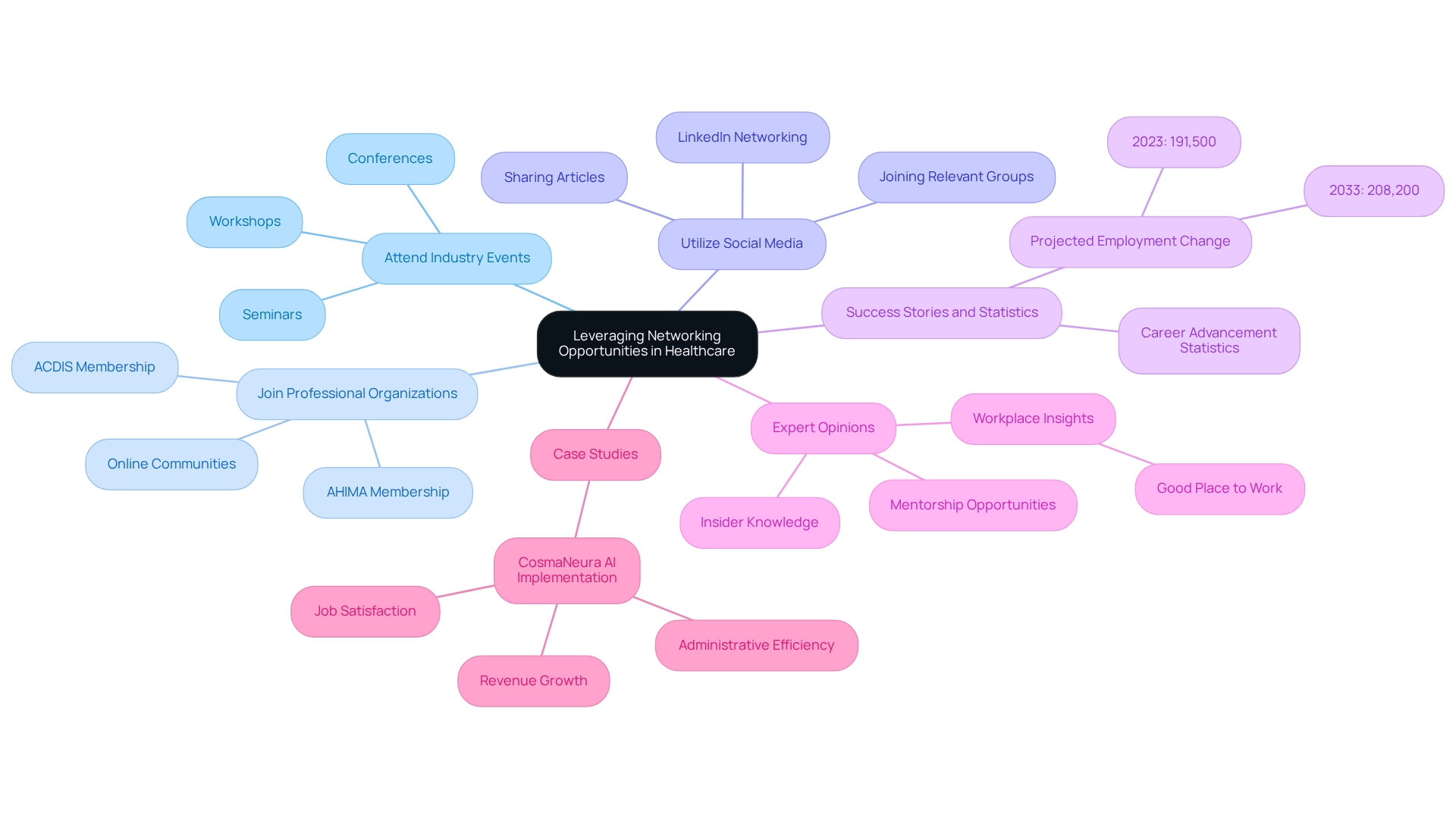
Utilizing Job Boards and Online Resources for Job Hunting
Searching for Health Record Specialist jobs can be a daunting task, filled with uncertainty and challenges. It’s essential to leverage a variety of online resources tailored specifically for this field to ease your journey.
Job Boards:
- Indeed: This leading platform is here to support you. It allows you to search for and set up job alerts, ensuring you stay updated on new listings that match your aspirations.
- ZipRecruiter: A user-friendly site that offers a wide range of job listings. You can browse and apply directly through the platform, streamlining the application process and saving you precious time.
- LinkedIn: Utilize LinkedIn's job search feature to discover openings and connect with recruiters. This enhances your networking opportunities in the healthcare sector, which can be invaluable in your job search.
Company Career Pages:
Don’t overlook the career sections of healthcare organizations. Many job postings may not be advertised on traditional job boards. By submitting applications directly via a company's site, you can significantly enhance your chances of attracting the attention of hiring managers.
Professional Associations:
Consider exploring job boards on professional association websites, such as the Association of Improvement Specialists (ACDIS). These platforms offer specialized job listings designed for healthcare roles, frequently showcasing opportunities that align with industry standards and best practices.
Salary Insights:
Understanding your potential earnings is crucial. The average salary for Improvement Specialists in Medical Records is approximately $64,797, providing a benchmark for your expectations. Christina DeBusk notes that the median income for a medical records expert is $48,780, offering a comparative view on salaries within similar positions. It’s also important to examine diversity and equity matters in the sector; data shows that Asian Improvement Specialists receive the highest average pay, while Black or African American specialists earn around $68,287.
By effectively utilizing these resources, you can enhance your job search tactics and access a wealth of opportunities that align with your skills and career goals. Remember, as highlighted in the case study of Cosmonauts, implementing AI solutions can lead to significant time efficiency and job satisfaction. This reinforces the importance of aligning your job search strategies with organizations that uphold ethical values in healthcare. Your journey matters, and with the right tools and support, you can navigate it successfully.
Preparing for Interviews: Tips for Clinical Documentation Specialist Candidates
Preparing for interviews as a Clinical Records Specialist can feel overwhelming, but with a strategic approach, you can navigate this process with confidence. Here are some essential steps to guide you:
- Research the Organization:
Take time to understand the organization's mission, values, and recent advancements in clinical record practices. Familiarity with their goals will empower you to articulate how your skills and experiences align with their objectives, showcasing your potential contribution to their team. - Common Interview Questions:
Anticipate questions that delve into your experience with clinical documentation, coding, and compliance. Additionally, prepare for behavioral questions that highlight your problem-solving abilities and communication skills. It's important to recognize that approximately are anticipated annually, underscoring the competitive nature of medical roles. This reality emphasizes the significance of thorough preparation for Specialist roles in medical records, as applicants must distinguish themselves in a crowded field. - Dress Professionally:
Choose professional clothing that aligns with the expectations of the medical environment. Presenting yourself as a competent and reliable candidate is crucial, as first impressions can significantly influence hiring decisions. - Follow-Up:
After the interview, sending a thank-you email to express your appreciation for the opportunity and to reiterate your interest in the position is a thoughtful gesture. This not only showcases professionalism but also strengthens your enthusiasm for the role. - Current Trends in Interview Preparation:
Stay informed about current trends in interview preparation for medical roles, particularly for Clinical Documentation Specialists. Understanding these trends can provide insights into what employers are prioritizing in candidates, allowing you to tailor your responses accordingly. - Successful Interview Strategies:
Implement successful strategies such as practicing mock interviews and seeking feedback from peers or mentors. Engaging in these activities can boost your confidence and elevate your performance during the actual interview. - Case Studies on Interview Preparation:
Consider examining case studies, such as the implementation of patient-facing materials for AI scribe technology, which emphasize the significance of transparency and patient engagement in medical care. Understanding how organizations communicate their innovations can provide valuable context for your discussions during interviews. For instance, TPMG's initiative to create educational handouts helped familiarize patients with AI technology, ensuring transparency and comfort during their interactions with medical providers. - Importance of Communication:
Effective communication is vital in the medical field. A study revealed that 81% of patients reported that their physician spent less time looking at the computer screen than in their previous visits. This highlights the necessity for Medical Record Specialists to promote clear communication between providers and patients, ultimately improving the overall care experience.
By adhering to these steps, candidates can enhance their readiness for Medical Record Specialist interviews, positioning themselves as strong contenders in an expanding field. Furthermore, comprehending the distinct role of firms such as CosmaNeura in the faith-oriented medical sector can better connect candidates with the principles and goals of prospective employers.
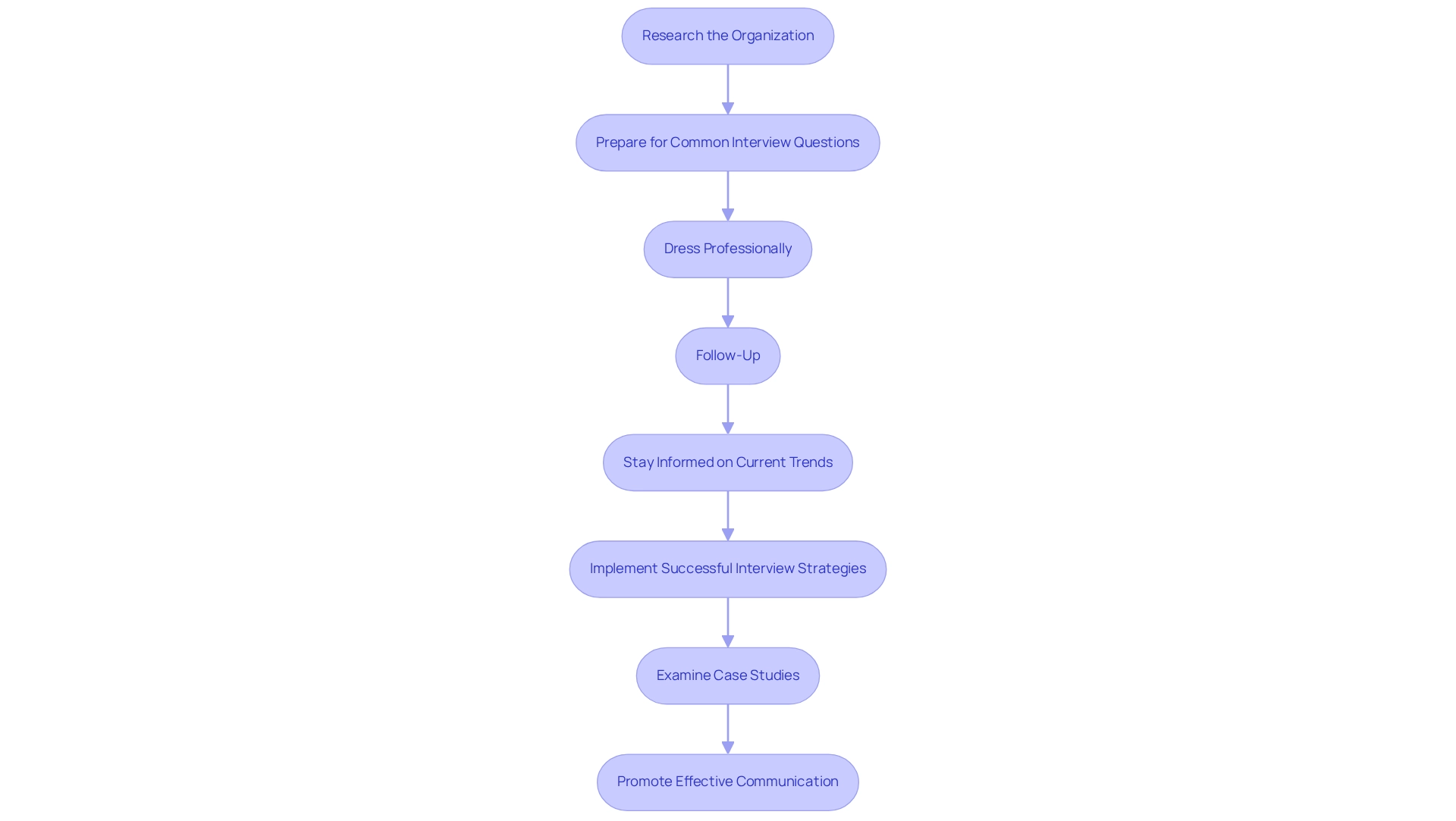
The Importance of Certification and Continuous Education in Clinical Documentation
Certification and ongoing education are essential for those pursuing clinical documentation specialist jobs near you. They significantly enhance your skills and open up new job opportunities in the ever-evolving medical landscape.
Benefits of Certification:
- Credibility: Achieving certification not only confirms your proficiency but also shows your commitment to the profession. This makes you a more appealing candidate to potential employers. Studies indicate that certified professionals often enjoy higher salaries, with the median annual income for all workers recorded at $48,060 in May 2023.
- Career Advancement: Many employers in the healthcare sector prefer or even require certification for advanced roles, leading to greater responsibilities and opportunities for growth. Educational programs in medical terminology and health data standards equip individuals for clinical documentation specialist jobs near you, while obtaining certification can significantly boost your job prospects and advancement potential.
Recommended Certifications:
- Certified Improvement Specialist (CCDS): Offered by the Association of Improvement Specialists (ACDIS), this certification validates your expertise in clinical records.
- Certified Improvement Practitioner (CDIP): Provided by the American Health Information Management Association (AHIMA), this certification focuses on improving record-keeping practices, crucial for compliance and quality care.
Continuous Education:
- Staying updated with industry trends, coding changes, and best practices is vital. Participating in workshops, webinars, and online courses can help you remain competitive in the field. Engaging in professional growth opportunities not only enhances your skills but also broadens your knowledge base, preparing you for the challenges of modern healthcare records. Ongoing education is linked to improved job performance and satisfaction, especially for those pursuing clinical documentation specialist jobs near you, as individuals committed to their learning often report greater career fulfillment.
Impact of AI on Demand:
- The rise of AI-driven solutions, such as those from CosmaNeura, may impact the demand for Medical Record Specialists, despite overall sector growth. As AI technology automates certain record-keeping tasks, the role of experts may evolve, requiring adaptation to new tools and methods.
Success Stories:
Many Medical Record Specialists have advanced their careers through ongoing education and certification. For instance, individuals who pursued further training and earned certifications have successfully transitioned into leadership positions, showcasing the tangible benefits of in this field.
In conclusion, obtaining certification and engaging in ongoing education are crucial steps for those seeking clinical documentation specialist jobs near you. These efforts not only enhance your career but also enable you to make meaningful contributions to the healthcare system. Moreover, understanding the changing landscape shaped by AI solutions like those from CosmaNeura can provide valuable insights into future career opportunities.
Exploring Career Advancement Opportunities in Clinical Documentation
Career progression possibilities for Medical Record Specialists can lead to fulfilling roles that carry greater responsibilities and impact within medical organizations. As the demand for qualified experts in health records management continues to grow, there are several promising avenues to enhance career paths.
Potential Career Paths:
- Health Records Improvement Manager: This role involves overseeing a team of Health Records Specialists (HRS) and implementing initiatives aimed at improving record-keeping practices. Managers in this position play a vital role in ensuring that clinical records comply with regulatory standards and support optimal patient care.
- Health Information Manager: Professionals in this capacity manage health information systems, ensuring adherence to medical regulations and safeguarding patient data. This role is crucial for maintaining the integrity and confidentiality of health records.
- Coding Specialist: Transitioning into coding roles allows Health Record Specialists to leverage their record-keeping expertise to enhance coding accuracy. This shift not only broadens their skill set but also opens doors to various opportunities within medical billing and coding departments.
Steps for Advancement:
- Pursue Additional Certifications: Obtaining certifications such as Certified Clinical Specialist (CCS) or Certified Health Information Manager (CHIM) can significantly enhance qualifications and marketability.
- Seek Mentorship: Connecting with experienced professionals in the field can provide valuable insights and guidance, helping to navigate career paths effectively.
- Participate in Leadership Training Programs: Engaging in leadership development initiatives can cultivate essential management skills, preparing specialists for higher-level roles. As highlighted by Imed Bouchrika, the influence of leadership development on businesses is significant, showing a 25% rise in organizational results in one study.
- Stay Updated on Industry Trends: Remaining aware of current trends in medical records and health policies can establish professionals as informed leaders in their area.
The environment for Specialists in Medical Records is evolving, with a notable increase in leadership positions and opportunities for career growth. Statistics from Clements et al. indicate that the highest number of outcomes reported was 19, or 23.2%, while Lornudd et al. reported 12 outcomes, or 14.6%. This underscores the importance of clinical record enhancement roles in improving patient care and organizational efficiency. Additionally, organizations that invest in leadership development see remarkable improvements in outcomes, emphasizing the necessity of nurturing leadership skills within this profession.
By actively pursuing these pathways and strategies, Healthcare Record Specialists can achieve and make meaningful contributions to the healthcare sector. Furthermore, companies like 3M Company, Optum, Nuance, and Epic Systems are key players in the clinical documentation improvement market, providing clinical documentation specialist jobs for aspiring specialists. The case study on CosmaNeura illustrates how AI-driven solutions can enhance job satisfaction and career opportunities for Clinical Documentation Specialists, connecting the content to real-world applications.
Conclusion
The role of Clinical Documentation Specialists (CDS) is increasingly critical in healthcare. These dedicated professionals ensure that patient records are accurate and compliant, which directly affects the quality of care and reimbursement processes. Their work involves reviewing documentation and collaborating with healthcare providers to maintain data integrity, essential for optimal patient outcomes.
For those aspiring to enter this rewarding field, developing key skills is vital. Attention to detail, strong analytical abilities, and effective communication are crucial. A solid educational foundation, relevant certifications, and a commitment to continuous learning can significantly enhance career prospects and credibility, opening doors to meaningful opportunities.
Navigating the job market can be challenging, but strategic networking and utilizing specialized job boards can make a difference. Tailoring applications to align with employer needs is essential. Engaging with professional organizations and leveraging online resources can expand opportunities and keep candidates informed about industry developments, fostering a sense of community and support.
As the healthcare landscape evolves, the demand for skilled Clinical Documentation Specialists is set to grow. By honing essential skills, embracing networking opportunities, and committing to ongoing professional development, CDS professionals can advance their careers while contributing to improved patient care and operational efficiency. Their expertise is crucial in ensuring that every patient receives the quality attention and care they deserve, making a real difference in the lives of others.




